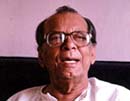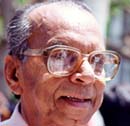
Chacha 420

|
Johnny Walker. Click for bigger pic!
|
Sharmila Taliculam spends some time with Johnny Walker and comes away with an intimate glimpse of the great comedian.
You remember that wheedling comedian in Pyaasa singing, Sar jo tera chakraye? Johnny Walker? No? Then you can't have seen many Hindi films. And -- we waggle our fingers reprovingly at this -- you haven't read our earlier interview with him.
For those who have known and loved (alright, hated too), there is much more of the man to see in Chachi 420. And as always, he plays a comedian. And, again, he staggers around with his trademark bottle.
Johnny Walker, born Badruddin Qazi, is also firm on doing only comic roles till he gets the films and roles he wants. Till then he'll cock a snook at the public, who'll love it all the same.
His fourteen years of exile from the movies was one of choice: he preferred not to stain his hands in the vulgar double entrendre that was in vogue for quite some time. Even now that he is back, he is wary of roles coming up unawares that may wallow in creepy cracks.
He accepted even Chachi 420 only because Gulzar, one of the few people he has kept in touch with, was the dialogue writer and the lyricist.
"I play Kamal (Hasan)'s friend who's also a make-up man. He comes to me for help when he wants to look like a woman." There was no problem working with Kamal Hasan. "That was between Shantanu and Kamal. Anyway, Shantanu had shot most of my scenes first, so I didn't get much chance to work under Kamal's direction. Again, why talk about it now? The film is doing well and I am happy."

|
With Kamal Hasan in Chachi 420. Click for bigger pic!
|
He also refutes charges of Kamal Hasan being egotistical. "I don't think that of him. I had fun acting in a film after a long time." And that brings him to his other reason for not working in movies.
"Film-making is so disorganised these days, that I didn't want to accept any and every film that came my way." And so he refused every film since he thought they were being made as they ought not to be.
"In my days, we used to work very hard. Even if the role was for two days and you were signed for five, we had to go to the sets those five days, even if you had to just sit with the make-up on. Now for a nine-to-five shoot the star only walks in at four in the evening and works for an hour," he says.
During the days when he was busy, he also had little time for his family. And when 'vulgarity' came in, he opted out. He felt it would be better to spend quality time with his family since he realised he couldn't see his children growing up and, anyway, movies were no big deal.
"I felt they won't recognise me as their father," So he packed his kit -- he thought for the last time. That, he feels, was his best decision.
"Today, my three daughters are happily married and settled in the States and my three sons are studying there," he says happily. Adding that things hadn't been as smooth as they sounded.
Having faced tough times in his youth, earning enough money was the main goal. His father used to teach weaving and earned about Rs 400. This was a lot of money in the 1930s. So the 12 children made merry until their father lost his job. Then they were forced to head for Bombay.

|
Click for bigger pic!
|
"The unfortunate part was that all the mills closed down one after the other, and my father couldn't continue for more that six months in one place." So when the Nizam of Hyderabad suggested he join his textile mill, it was literally an offer he couldn't refuse. Anyway, what could happen to a Nizam's mill, they thought. Till some riots there got dad out of a job again.
Films were taboo in the Qazi household. For his father didn't like it. But canny Badruddin had stayed back in Bombay, with the idea of pursuing his dream. He got some itsey-bitsy roles that left him even more hungry for work. And when the family returned dejected from Hyderabad, it was left to him to take care of them.
His elder brother felt himself above work. "So the responsibility fell on me," he recalls. He became a bus conductor, one of whose passengers was Balraj Sahni, who put him in touch with Guru Dutt who was making Baazi ... And the rest is Indian film history.
"Guru Dutt and I were good friends in the sense that he trusted me and I did the same. We both knew what was expected of us professionally. So we worked well. Also personally there was a lot of meeting each other and having lunches and dinners together." Those days he held at least two parties every week at his house. Which meant lot of socialising. "Yes, I would socialise a lot. We all liked it then because of the camaraderie that existed." But he absolutely refuses to delve into the darker side of Guru Dutt.
People were friendlier then, he says, putting the past in soft focus.

|
With Tabu at the launch of Chachi 420. Click for bigger pic!
|
"The top heroes Dilip Kumar, Raj Kapoor and Dev Anand were good friends and there was no mudslinging like these days. Everything was peaceful and everybody had only one thing in his mind -- to give their best to the film they were working in." And such was his popularity that producers wanted him in their films, if only for a song. His schedule was so busy he nearly didn't get time to get married.
"Those days we were under contract and the work had to get over by a certain period. We couldn't just walk off. So when I got married I had to finish my film. But we did go for a honeymoon if that is what you mean," he laughs.
Humour comes naturally to him. He loved to regale people with anecdotes and jokes all the time. And he improvised on his dialogues all the time. "Guru Dutt would have one assistant always writing down what I said with every take. And he would use the best one in his film." But in real life, Walker was serious, almost grim. That, he confesses, is because he is not comfortable with everybody.
"I joke often, but with a few close friends. And then why should I carry on with my screen image off it too?" he asks.
He also declares that his home is his castle. And its simplicity reflects his personality.
"I hate the usual filmi look in the house. Plus my house is my home, not a shop where people can come and look. You will find no film posters or pictures or awards in my home. It just has whatever is necessary for a comfortable home". So there is a watch with the picture of the Ka'aba in Mecca -- a nice mix of the utilitarian and -- the religious?
"That I am. Because I feel that it with His Grace I got all this fame, money and a good family". A wonderful family, he emphasises.
He first refused to pull strings for one of his sons who wanted to star in a movie. And then finally put his own money into the movie.
There he learnt how things worked in modern Bollywood -- that the stars charged exorbitantly and that they told the director whom to pick, whom not.
"When I acted in films, the director was the captain and we did as he told. Now the stars dictate what should be done right from their choice of a director to a co-star." The film was completed, but is still in the cans. So his son resigned himself to a computer graphics course in the US.

|
Click for bigger pic!
|
Money, says the great comedian, was never a big lure for him -- he believed that one should earn only so much as to live in comfort.
"There has to be a limit to everything. I was insecure about money because of the hard days I had undergone. But I saw to it that everybody was settled well into his or her lives before retiring. I got my sisters married, bought property in their names, built this house for myself and got my children educated. Then I stopped acting."
At 74, Johnny Walker appears very fit. His schedule includes prayer and meals on time. "Anybody who knows me knows I have to eat on time wherever I am. They want me home on time for that. I am at home till about three after which I go out and am out till seven. Sometimes when I get late, everybody in the family worries," he says, loving the thought.
He also loves his grandchildren and even makes a US visit that lasts less than a week to meet them. That was when "my grand-daughter had malaria and the doctors in America had to actually open a book to know what that was... It was hectic travelling, but worth it. I will do this for my children anytime." He also insists that everybody in his family should be taught Indian culture so that they don't forget Indian values living in America. To the same end, he also sees to it that each of his grandchildren stays with him for at least three years.
So, finally, his world is the way he wants it. "One needs a house to stay in, a telephone to keep in contact with people, and a car to be able to move around freely. I have all the three and also a good, healthy family. I am content."
Johnny Walker photographs: Jewella C Miranda
EARLIER FEATURE:
"But where are the comedians?"
|